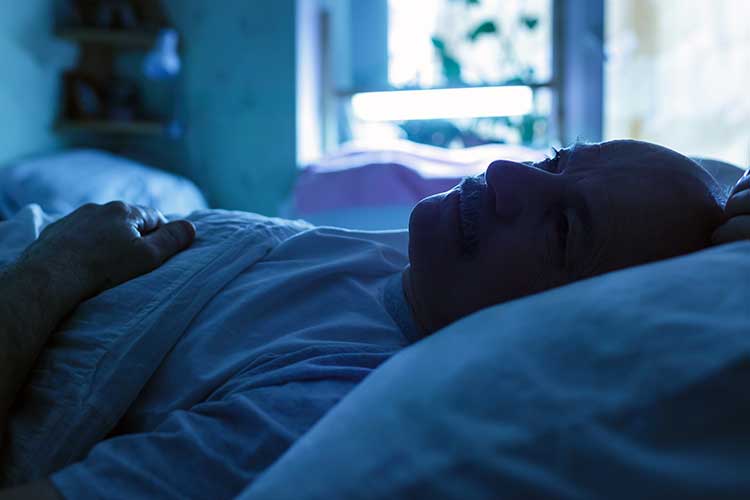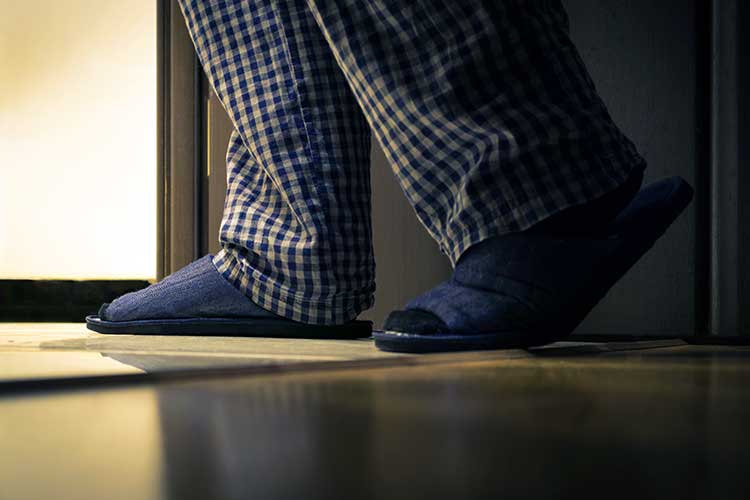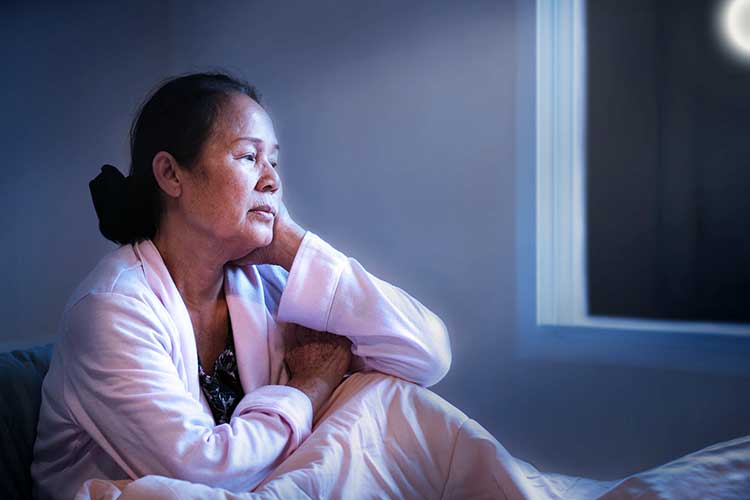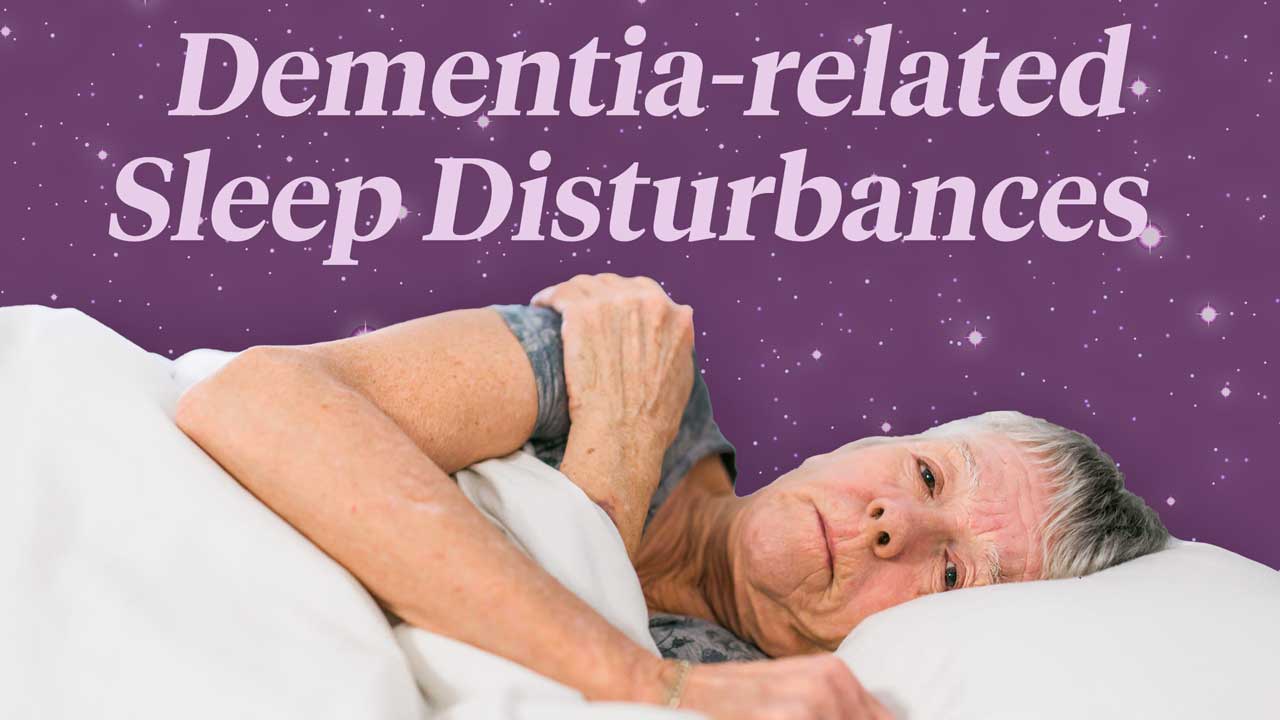Sleep issues are among the most challenging dementia symptoms to manage (Dementia Australia 2017a).
Up to 25% of people with mild or moderate dementia and 50% of people with severe dementia are affected by sleep disturbances, with these issues worsening as the condition progresses (Mayo Clinic 2021).
With more than 50% of aged care residents in Australia living with dementia (AIHW 2023), how can you support those who are having difficulty sleeping?
Sleep Disturbances Caused by Dementia
Some people with dementia may experience a disturbed sleep pattern, causing them to sleep during the day and feel awake and restless at night. They may have difficulty falling asleep at night and will wake up frequently, then struggle to go back to sleep (Alzheimer’s Society 2022).
In some cases, a client may wake up prematurely, become disoriented and attempt to get dressed or leave the premises. Some clients may struggle to differentiate between day and night altogether (NHS 2021; Dementia Australia 2017a).
As dementia progresses, many people will begin to sleep for longer and may eventually spend a significant portion of their time asleep. Sleep disruptions can also contribute to feelings of tiredness during the day, and may consequently lead to long periods of sleep. The client will not necessarily be aware that they are experiencing sleep issues (Alzheimer’s Society 2021a, 2022).
It is estimated that people with late stages of Alzheimer’s spend most of the day sleeping, but are awake for about 40% of the night (Alzheimer's Association n.d.).

Sundowning
It is estimated that up to 20% of people with dementia experience a phenomenon known as sundowning, wherein symptoms worsen around the time of sunset (Canevelli et al. 2016).
People experiencing sundowning might become restless, confused, anxious or insecure, leading to aggressive, demanding and suspicious behaviour. In some cases, they may hallucinate (particularly when it is dark) or engage in potentially harmful behaviour. Sundowning seems to be exacerbated by changes to routine (Healthdirect 2020).
Disturbed or insufficient sleep might play a role in the occurrence of sundowning. Furthermore. people experiencing sundowning may feel too restless to sleep properly (Healthdirect 2020; Alzheimer's Association 2012).
What Causes Sleep Disturbances in People With Dementia?
Factors that may cause people with dementia to experience sleep disturbances and sundowning include:
- Alterations to the internal body clock
- Exhaustion at the end of the day (both physical and mental), particularly in the later stages of dementia where even simple tasks such as eating and communicating become more tiring
- Less need for sleep due to being less active
- Disorientation
- Reduced lighting and increased shadows, which may cause confusion and fear
- Obstructive sleep apnea, which is common among people with Alzheimer's disease
- Excessive sleep during the day
- Changes to routine or environment (e.g. being hospitalised)
- Agitation or restlessness
- Disturbing dreams.
(Mayo Clinic 2021; Dementia Australia 2017a; Alzheimer’s Society 2022)
Other factors that are not necessarily related to dementia but may contribute to sleep disturbances include:
- Comorbidity
- Pain
- Infection
- Depression
- Medicines
- The room temperature being too hot or cold
- Poor bathroom accessibility
- Going to bed too early
- Caffeine or alcohol
- Hunger.
(Dementia Australia 2017a)
The Impacts of Sleep Disturbance

Some people with dementia may sleep for up to 14 or 15 hours per day. However, this is not necessarily good quality sleep (Alzheimer’s Society 2022).
The consequences of sleep disturbance in people with dementia include decreased emotional and physical health, worsened cognitive symptoms and an overall decrease in quality of life (Kinnunen et al. 2017).
Wandering caused by disorientation or restlessness can be potentially dangerous if the client manages to leave the facility or goes missing. This can be quite a worrying event that raises concerns for the client’s safety (Dementia Australia 2017b).
Supporting Clients Experiencing Sleep Disturbances
The following strategies may help clients with dementia sleep more comfortably:
- Review medicines
- Manage pain
- Maintain a consistent daily routine whenever possible
- Try to maintain a consistent environment for the client
- Try to maintain a comfortable room temperature (the client may be too hot or too cold when waking up)
- Ensure lighting is adequate
- Consider moving any mirrors if the client is having difficulty recognising themselves or others, as this can contribute to confusion
- Implement night lights or keep hallway lights on to educe confusion and assist with bathroom access at night
- Consider placing a commode beside the bed if the client is having difficulty finding the bathroom at night
- Remove tripping hazards such as furniture or lose rugs
- Ensure the client’s bed is comfortable and keep familiar items nearby to assist with orientation
- Keep a clock nearby that shows whether it is day or night
- Give the client a soft toy to cuddle
- Keep day clothes out of view at night to reduce confusion (the client may wake up in the middle of the night, see the clothes and think it is time to get ready for the day)
- Encourage the client to get an appropriate amount of exercise (but not too close to their bed time)
- Ensure the client gets adequate sunlight every day and is able to participate in activities
- Reduce caffeine intake (e.g. coffee, cola, tea, chocolate) during the day and avoid giving caffeine in the evening
- Consider giving the client a light snack before bed if they are getting hungry at night
- Bathing or showering before bed may assist with relaxation
- Herbal tea or warm milk may help with sleep
- Try to avoid performing any potentially-upsetting tasks in the afternoon
- Review the safety of the facility in case the client wanders
- Consider quietly playing the radio beside the client’s bed
- Gently remind the client that it is night time if they wake up
- Monitor bowel actions and ensure a bowel management plan is in place if there are concerns.
(Dementia Australia 2017a; Alzheimer’s Society 2021b; Alzheimer's Association n.d)
What to do if a Client Wakes up in the Middle of the Night

- Calmly approach the client.
- Ask if the client needs anything.
- Gently remind the client that it is the middle of the night and time to sleep.
- Avoid arguing with the client.
- Reassure the client that everything is alright.
- Allow the client to pace under your supervision if they feel the need to do so. Do not use any type of restraint.
(Alzheimer's Association 2012)
Conclusion
As an aged care worker, you are likely to interact with many clients who have dementia. In order to appropriately care for these clients and ensure they are comfortable and safe, it is important to understand how dementia can affect sleep and how these disturbances can be managed.
Sleep issues in those with dementia can be challenging to navigate. As well as ensuring that your clients are able to have regular periods of rest, it is important for you to get adequate sleep as well (Dementia Australia 2017a).
Test Your Knowledge
Question 1 of 3
You are working at an aged care facility. One of your clients, Morris, wakes up in the middle of the night feeling restless. He wants to move around and is becoming distressed. What should you do?
Topics
References
- Alzheimer's Association 2012, Sleep Issues and Sundowning, Alzheimer's Association, viewed 12 October 2023, https://www.alz.org/help-support/caregiving/stages-behaviors/sleep-issues-sundowning
- Alzheimer's Association n.d., Treatments for Sleep Changes, Alzheimer's Association, viewed 12 October 2023, https://www.alz.org/alzheimers-dementia/treatments/for-sleep-changes
- Alzheimer’s Society 2022, ‘Is it Typical for People With Dementia to Sleep a Lot During the Day?’, Alzheimer’s Society Blog, 12 May, viewed 12 October 2023, https://www.alzheimers.org.uk/blog/is-it-typical-people-dementia-sleep-lot-during-day
- Alzheimer’s Society 2021b, How to Support Someone With Dementia to Sleep Better at Night, Alzheimer’s Society, viewed 12 October 2023, https://www.alzheimers.org.uk/about-dementia/symptoms-and-diagnosis/healthy-sleep-tips
- Alzheimer’s Society 2021a, Sleep Problems and Treatments for People With Dementia, Alzheimer’s Society, viewed 12 October 2023, https://www.alzheimers.org.uk/about-dementia/symptoms-and-diagnosis/sleep-and-night-time-disturbance
- Australian Institute of Health and Welfare 2023, Dementia in Australia, Australian Government, viewed 11 October 2023, https://www.aihw.gov.au/reports/dementia/dementia-in-aus/contents/aged-care-and-support-services-used-by-people-with/residential-aged-care
- Canevelli et al. 2016, ‘Sundowning in Dementia: Clinical Relevance, Pathophysiological Determinants, and Therapeutic Approaches’, Front Med (Lausanne)., vol. 3, viewed 12 October 2023, https://www.ncbi.nlm.nih.gov/pmc/articles/PMC5187352/
- Dementia Australia 2017a, Sleeping, Dementia Australia, viewed 11 October 2023, https://www.dementia.org.au/information/about-you/i-am-a-carer-family-member-or-friend/personal-care/sleeping
- Dementia Australia 2017b, Wandering, Dementia Australia, viewed 12 October 2023, https://www.dementia.org.au/national/support-and-services/carers/behaviour-changes/wandering
- Healthdirect 2020, Sundowning, Australian Government, viewed 12 October 2023, https://www.healthdirect.gov.au/sundowning
- Kinnunen, KM, Vikhanova, A & Livingston, G 2017, ‘The Management of Sleep Disorders in Dementia’, Current Opinion in Psychiatry, vol. 30 no. 6, viewed 12 October 2023, https://journals.lww.com/co-psychiatry/fulltext/2017/11000/the_management_of_sleep_disorders_in_dementia__an.16.aspx
- Mayo Clinic 2021, Alzheimer's: Managing Sleep Problems, Mayo Clinic, viewed 11 October 2023, https://www.mayoclinic.org/healthy-lifestyle/caregivers/in-depth/alzheimers/art-20047832
- National Health Service 2021, Looking After Someone With Dementia, NHS, viewed 12 October 2023, https://www.nhs.uk/conditions/dementia/living-with-dementia/looking-after-someone/
 New
New 
